MRRL Hall of Fame
TERRY KNIGHT AND THE PACK
- Details
- Category: Inductees
- Created: Friday, 30 September 2011 08:30
- Written by Gary Johnson
Terry Knight & The Pack was one of Michigan’s most popular bands in the mid-Sixties. They recorded numerous regional hits, but the band only managed to break into the Billboard Hot 100 once with their cover of Ben E. King’s “I (Who Have Nothing)”. Terry Knight and The Pack is probably most important, however, as the launching pad for one the 1970’s biggest rock groups, Grand Funk Railroad.
According to David A. Carson’s Grit, Noise, And Revolution, Richard Terrance Knapp (a.k.a. Terry Knight) was born in Lapeer, Michigan, just outside of Flint in 1943. Terry was turned on by the early sounds of Rock and Roll radio and especially the personality deejays like Dick Biondi whose powerful signal from WLS in Chicago was easily picked up nightly on Terry’s radio in Lapeer. Young Terry set his sights on becoming a deejay and began to practice his radio patter at his home on his own tiny reel to reel tape recorder.
By the tenth grade, Terry had already taken an audition tape to WLS, whose program director had advised him to finish school and to keep practicing his craft. Terry then got his first radio job at a small station in Alma, Michigan, and after graduating from high school, he was hired as deejay Terry Knapp at Flint’s powerful AM station, WTAC.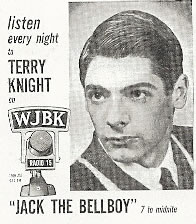 DJ Terry Knight
DJ Terry Knight
After developing a reputation at WTAC for breaking hits, Terry was offered an important deejay position at WJBK in Detroit, manning the seven-to-midnight Jack The Bellboy Show. It was at WJBK that he began to use the name Terry Knight on his show. Knight’s tenure at the station was cut short, however, over an incident involving his taking $200 from some record promoters.
After being fired by WJBL, Knight managed to get an even better position at Windsor, Canada’s CKLW, a Top 40 station across the river from Detroit featuring one of the most powerful AM signals in North America.
At CKLW, Terry was one of the early advocates of the Rolling Stones, and he became acquainted with members of the group during their first tour of North America in 1964. Knight, however, was becoming increasingly frustrated with the restrictions on what he could and could not play on the air at CKLW.
He had learned to play the guitar while at WJBL the year before, and Knight began to consider a career as a singer and songwriter. After recording an unsuccessful single and then performing in coffeehouses around Detroit, Knight decided to resign from CKLW and declared on his last show that he would be moving to England and staying with Brian Jones of the Rolling Stones.
Instead, in need of money, Knight took a deejay job at Flint station WTRX. It was there that, hosting a record hop, he met up with a local band that would become his ticket into Rock and Roll. .jpg) The JazzMastersThey called themselves the JazzMasters after the Fender guitar model of the same name. When Knight met the band, they were made up of Don Brewer on drums, Herm Jackson on bass, Al Pippins and Curt Johnson on guitars, and Bobby Caldwell on keyboards.
The JazzMastersThey called themselves the JazzMasters after the Fender guitar model of the same name. When Knight met the band, they were made up of Don Brewer on drums, Herm Jackson on bass, Al Pippins and Curt Johnson on guitars, and Bobby Caldwell on keyboards.
Although the JazzMasters hailed from rural Swartz Creek, a small all-white suburb west of Flint, they played the soul music of James Brown, Wilson Pickett, and early Motown.
Terry was impressed with the band and approached the JazzMasters about becoming their lead singer. The young band was very impressed with Knight’s numerous contacts in the music business and agreed to the partnership.
Knight immediately took control of the group, dictating a change from the JazzMasters’ uniforms into a more fashionable look that reflected the popular Rolling Stones. Knight also changed the name of the band to ‘The Pack’ after the recent # 1 hit by the Shangri-La’s, “Leader Of The Pack”.
Knight then used his contacts to enable the Pack to record its first single “Tears Come Rolling/The Colour Of Our Love” at the Golden World Studio in Detroit. The record was released on Wingate, a Detroit R&B label whose singles Knight had once played while a deejay at WJBL and CKLW. Their record got some local airplay, and the Pack became a popular attraction at area teen clubs.
The band was managed at this time by Flint businessman Jim Atherton, who felt that an R&B label like Wingate could not properly promote a Rock and Roll group like the Pack. Atherton convinced his friend, fellow Flint businessman Otis Ellis, to record the band on his small Lucky Eleven label.
But before the band recorded their second single there were some major changes. First, the band name was changed to Terry Knight and The Pack reflecting the popularity and control the charismatic front man had in the group. Secondly, Knight fired guitarist Al Pippins from the band when he failed to make a scheduled local television appearance – he was getting married that same day.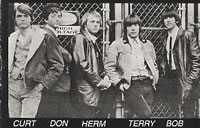 Terry Knight & The Pack
Terry Knight & The Pack
This version of Terry Knight and The Pack released their second single in late 1965. This time the results were more interesting.
Terry wrote and produced both sides of the Lucky Eleven single. “How Much More (Have I Got To Give)” sounded very much like the recent Rolling Stones hit “Get Off My Cloud”, and even mentioned Mick Jagger’s name in the lyrics. The flipside was a folk-rock song called “I’ve Been Told”. Although neither song did anything on the national charts, they did get significant airplay on Mid-Michigan AM radio stations.
When the Rolling Stones played Cobo Hall in Detroit in late 1965, Terry Knight and The Pack was the opening act and played before the biggest crowd of their career. The band also opened for the Yardbirds at a big show at Flint’s I.M.A. in December of that year. It would be where they would hear the song that would become their first # 1 hit in Michigan, and it would be the first night that Mark Farner would take the stage with the band.
Farner had grown up in Flint and had played in briefly in a local band with the Pack’s guitarist Curt Johnson. Mark was also acquainted with manager Jim Atherton, so when bassist Herm Jackson enlisted in the Navy to avoid the draft, Farner was offered his spot in the Pack.
The band had heard the Yardbirds perform a song from their most recent album called “You’re A Better Man Than I” at the I.M.A. show. Terry and the band loved the song, and they traveled to Cleveland to record it in February of 1966. With the title shortened to “Better Man Than I”, the single quickly became the band’s biggest hit in Michigan, topping the radio charts on both Flint and Detroit stations. The song also marked Terry Knight and The Pack’s first appearance on Billboard’s Bubbling Under The Hot 100 chart, peaking at # 125.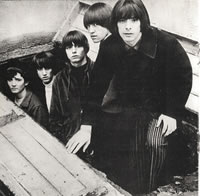 (L to R) Don Brewer, Bobby Caldwell, Curt Johnson, Mark Farner, Terry Knight
(L to R) Don Brewer, Bobby Caldwell, Curt Johnson, Mark Farner, Terry Knight
For their important follow-up single, Knight pulled off what seemed like an amazing coup. Through his contacts with the Stones, he had managed to get an advanced copy of the band’s new single.
Terry had the band quickly record one of the new Jagger-Richards songs called “Lady Jane” on Lucky Eleven before the Rolling Stones had released their version in the United States. Terry Knight and The Pack got a lot of publicity for the recording, but they were forced to pull the record off the market when the Rolling Stones objected to its release.
Terry Knight and The Pack released another single “A Change Is On The Way/What’s On Your Mind” to replace “Lady Jane”, and they began to make the rounds of teen oriented music shows. The band appeared on Robin Seymour’s Swingin’ Time in Detroit, Don Webster’s Upbeat show out of Cleveland, and Dick Clark’s Where The Action Is. “A Change Is On The Way” benefited from the television exposure and managed to reach # 111 on Billboard’s Bubbling Under The Hot 100 chart.
In September of 1966, the band released their cover of “I (Who Have Nothing)” backed with the Knight-penned “Numbers”. The single was not only a major success in Michigan, but it became Terry Knight and The Pack’s only national hit peaking at # 46 on the Billboard Hot 100.
Mark Farner, who was unhappy with Knight’s total control of the group, left to join Dick Wagner’s band, the Bossmen, at this time. Farner’s place was taken by former member Herm Jackson, who was passed over by the military because of a broken leg. To take advantage of the momentum provided by “I (Who Have Nothing)”, the band released their first album on Lucky Eleven, “Terry Knight And The Pack”. The album contained their big hit, along with some early singles, and a few new songs. Their version of “Lady Jane” was also included on the set.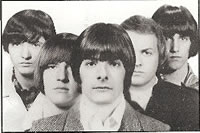 (L to RE) Don Brewer, Mark Farner, Terry Knight, Herm Jackson, Bobby Caldwell
(L to RE) Don Brewer, Mark Farner, Terry Knight, Herm Jackson, Bobby Caldwell
At the start of 1967, however, Farner was back in Terry Knight and The Pack. The Bossmen had broken up, Knight had fired guitarist Curt Johnson, and he asked Mark Farner to come back in the group.
That same month the band went into the studio to record a new song called “This Precious “Time” written by the hot folk-rock songwriting team of P.F. Sloan and Steve Barri. The flipside was a Knight-penned rocker called “Love, Love, Love, Love, Love”. Despite the quality of both sides of the single, neither song became a breakout hit. Terry Knight and The Pack did have the distinction, however, of charting both songs on Billboard’s Bubbling Under The Hot 100, “This Precious Time at # 120 and “Love, Love Love, Love, Love” at # 117.
The band’s next single was a cover of the Joe Tex R&B hit, “One Monkey Don’t Stop No Show”. It was popular in Michigan but did nothing nationally. The group then released its second album “Reflections” containing the last two singles and several new tracks written by Terry Knight.
Shortly after the album’s release, Knight and the band had a parting of the ways. The band brought back Curt Johnson and continued as the Fabulous Pack, while Terry Knight pursued a solo career.
The Fabulous Pack released some quality singles in 1967 and 1968 starting with their cover of the old Bob and Earl hit, “Harlem Shuffle”. The song’s flipside, “I’ve Got News For You”, was written by Dick Wagner.
Wagner also penned the band’s next single, “Wide Trackin’”. The song had been written for use in an advertising campaign for Pontiac’s ‘wide tracking’ automobiles. Lucky Eleven owner Otis Ellis heard the song and sent the Fabulous Pack to Nashville to record it. Released in the late summer of 1967 to coincide with the fall preview of the new car models, it became the only Lucky Eleven single to be issued with a picture sleeve. Promotional copies were then given to Pontiac dealerships, and while “Wide Trackin’” became a solid regional hit, it did not chart nationally. 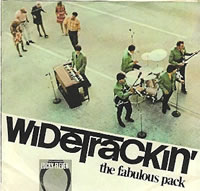 The Fabulous Pack - "Wide Trackin'" 45 picture sleeve
The Fabulous Pack - "Wide Trackin'" 45 picture sleeve
By 1968, Don Brewer and Mark Farner were in control of the band but the Fabulous Pack was nearing the end of the line. Following a period when the band went through a number of personnel changes caused by members being drafted or replaced, Brewer and Farner decided to give it one more shot with a single on Capitol Records.
They chose to cover a song by Jimi Hendrix called “Fire”. With new member Craig Frost on keyboards, the Fabulous Pack released their version of the song in the spring of 1968 with the slightly altered title of “Next To Your Fire”. The record was popular in Michigan but did not do well outside the state. The single did, however, provide a preview of what was to come a year later when Farner and Brewer put together Grand Funk Railroad.
For his part, Knight put together a short-lived group called the Terry Knight Revue and released some interesting singles including the regional hits, “Come Home, Baby” and “Lizbeth Peach”. After auditioning for the Beatles’ Apple Records in 1969, Knight wrote a tribute to Paul McCartney entitled “Saint Paul”.
Released in the spring of 1969 on Capitol Records, "Saint Paul" included brief snippets of several Beatle songs including “Hey Jude”. The song reached # 114 on Billboard’s Bubbling Under The Hot 100, and it is credited with kick-starting the famous “Paul Is Dead” controversy that sprang out of Michigan in late 1969 to become the most famous rumor in the history of Rock and Roll. Knight would become even more famous (or should it be infamous?) as the manager and producer of Grand Funk Railroad in the early 1970’s.
After several Grand Funk reunions and break-ups over the years, Don Brewer is still drumming with his version of Grand Funk Railroad which includes original bassist Mel Schacher. Mark Farner is recording and performing as a successful solo act. He also still jams occasionally with original Pack members Bobby Caldwell, Curt Johnson, and Herm Jackson.
Terry Knight had been out of the public eye for years other than a rather creepy appearance on a VH1 Behind The Music episode about Grand Funk Railroad in the 1990's. Knight had obviously fallen quite a ways since his days as the Jagger-like front man of Terry Knight and The Pack and the winner of a multi-million dollar lawsuit after he was fired as manager of Grand Funk Railroad.
There were whispers over the years that Knight had been heavily involved in cocaine use and dealing. Others claimed he was in a witness protection program after testifying against an East coast drug lord.
Everyone was shocked, however, when it was reported in 2004 that he had been stabbed to death at the age of 61 in Temple, Texas. The murderer was Donald Fair, the boyfriend of Knight’s daughter, who shared an apartment with Knight. It happened during a domestic dispute. Knight was stabbed 17 times trying to defend his daughter from her live-in boyfriend who was high on methamphetamine.
Despite Terry Knight’s grisly end, he is best remembered as the lead singer and main songwriter for one of Michigan’s most popular bands of the 1960’s. Terry Knight and The Pack were voted into Michigan Rock and Roll Legends Hall of Fame in 2008. "Better Man Than I" was voted a Legendary Michigan Song in 2015.
MRRL Hall of Fame: https://www.michiganrockandrolllegends.com/mrrl-hall-of-fame
Video: Check out Terry Knight & The Pack's Michigan hit "Better Man Than I" along with A-Bomb visuals at https://www.youtube.com/watch?v=eUBQ7Hhxeo0
Dr. J. Recommends:
“The Pack Anthology”, Lucky Eleven CD. .jpg) "The Pack Anthology" CDThis excellent 22-track collection is basically an official bootleg that can be purchased from Mark Farner’s site. It not only collects the singles with Terry Knight as the lead singer but also the singles released by the Fabulous Pack. The CD booklet, written by Farner’s biographer Kris Engelhardt, is very detailed and I used it as a main source for much of the information in the band’s biography.
"The Pack Anthology" CDThis excellent 22-track collection is basically an official bootleg that can be purchased from Mark Farner’s site. It not only collects the singles with Terry Knight as the lead singer but also the singles released by the Fabulous Pack. The CD booklet, written by Farner’s biographer Kris Engelhardt, is very detailed and I used it as a main source for much of the information in the band’s biography.
"Terry Knight And The Pack/Reflections" ABKCO Music & Records CD. This two-fer CD contains both of the band's Lucky Eleven albums. 15 of the 24 songs are on "The Pack Anthology". "Reflections" is the weaker of the two albums containing several Knight songs indicative of his later solo recordings, but the debut LP is a garage rock classic.
